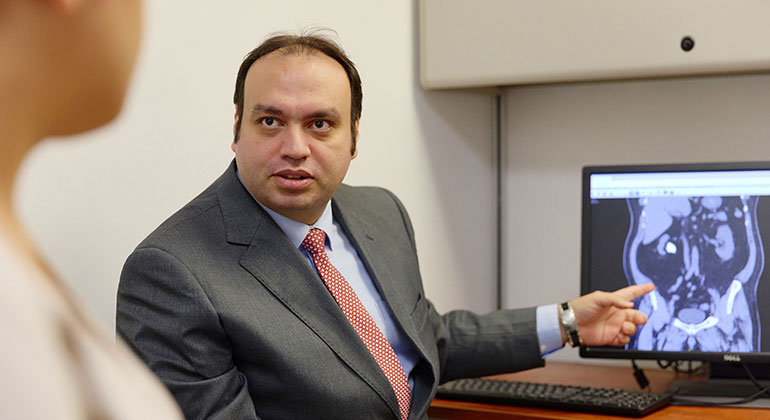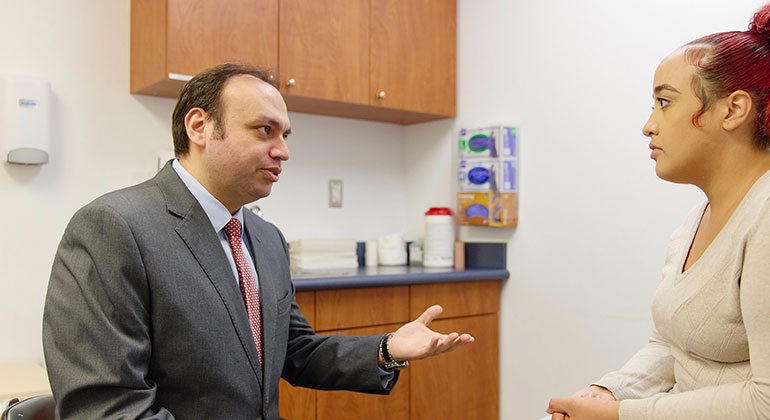

Urology
At Mount Sinai Brooklyn, we offer expert care for urological conditions that range from common to complex. With state-of-the-art equipment, we provide the most advanced care available. Whenever possible, we use minimally invasive procedures, which promote quicker healing, limit scarring, and lower the risk of complications. We are here for you.
Conditions We Treat
At Mount Sinai Brooklyn, we treat all types of urologic conditions, including both cancer and non-cancerous ones.
Urologic Cancer
Urologic cancers affect the urinary system for both men and women as well as the male reproductive system. Our specialists use a team approach to diagnose and treat cancerous conditions. If you need imaging or lab testing, we can send you to one of our partner organizations or to a provider of your choosing. We treat all urological cancers, including:
- Adrenal gland: Rare cancer that forms in the small glands at the top of the kidneys
- Bladder: Cancer affects the bladder lining
- Kidney (renal): Cancer that forms in the tiny tubes that clean the blood
- Penile: Rare cancer that affects the penis
- Testicular: Rare cancer that affects the testes
- Urethral: Rare cancer that affects the tube that leads urine from the bladder to the outside of the body
Other Conditions
Our experts also diagnose and treat a wide range of benign conditions affecting the prostate, kidney, and bladder. These include:
- Benign prostate hyperplasia (BPH): Enlarged prostate that creates problems with urination
- Bladder fistulas: Opening between the bladder and another organ
- Elevated prostate-specific antigen (PSA): An early sign of prostate cancer
- Erectile dysfunction (ED): Inability to maintain an erection
- Hydronephrosis: Swelling of one or both kidneys
- Kidney disease and failure: Damage that makes the kidneys unable to filter blood properly
- Kidney stones: Mineral deposits that form inside kidneys
- Incontinence: Loss of bladder control that can affect both men and women
- Male infertility: Results from damage to male reproductive tract
- Pelvic organ prolapse: One or more of the organs in the pelvis slips out of position and pushes on the vagina
- Urinary tract infections: Bacterial infection in the urethra
Treatments We Offer
Our knowledgeable specialists will conduct a thorough review of your case and perform all the necessary diagnostic tests to develop an individualized treatment plan for you. Patients with urologic cancers will also be able to receive infusion therapy without leaving Brooklyn in our state-of-the-art Ambulatory Infusion Center. Our advanced facilities and equipment enable us to offer a wide variety of treatments including:
- Adrenalectomy: Removal of one or both adrenal glands
- Cystectomy: Removal of the bladder. In men, this means removal of the bladder, prostate, and seminal vesicles. In women, it means removal of the uterus, ovaries, and part of the vagina.
- Cystoscopy: Procedure for examining the bladder and urethra
- Kidney transplantation: Replacing a diseased kidney with a healthy one
- Lithotripsy: Use of shock waves to break up kidney stones
- Male circumcision: Removal of the skin at the tip of the penis
- Microscopic varicocelectomy: Procedure to restore blood flow to male reproductive organs
- Nephrectomy: Removal of one or both kidneys to treat kidney tumors (robotic radical nephrectomy and partial nephrectomy)
- Open surgery: Traditional approach that requires a long incision
- Orchiectomy: Removal of one or both testes
- Orchiopexy: Repair of testes that have not descended
- Partial nephrectomy: Removal of part of one kidney
- Penile implants and prostheses: Devices that enable men with erectile dysfunction to get and maintain an erection
- Penile plication: Procedure to treat the curvature of the penis
- Percutaneous nephrolithotomy: Removal of kidney stones
- Prostate biopsy: Collecting tissue samples from prostate gland
- Prostate cancer screening: Administration of prostate specific antigen (PSA) test to check for early signs of prostate cancer
- Prostatectomy: Partial or complete removal of a prostate to treat prostate cancer (robotic radical prostatectomy)
- Robotic and laparoscopic surgery: Use of minimally invasive surgical approaches that minimize incisions and speed up recovery time
- Transurethral incision of the prostate: Intervention to treat benign prostatic hyperplasia (BPH)
- Transurethral needle ablation: Use of radiofrequency ablation to shrink prostate tissue that is pressing into the urethra and causing urinary symptoms
- Transurethral resection of the prostate: Trimming prostate tissue to treat enlarged prostate that is causing difficulty urinating
- Urodynamics: Tests to check urinary tract function
- UroLift: Procedure to treat mild to moderate prostate enlargement.
- Uteroscopy: Procedure for diagnosing and treating kidney stones
- Vasectomy: Cutting off sperm supply to semen for permanent birth control for men
- Vasectomy reversal: Surgery to undo a vasectomy
At Mount Sinai Brooklyn, our providers collaborate closely within our hospital and with health care professionals throughout the Mount Sinai Health System. If you need a subspecialist’s care, our staff can help coordinate your care and connect you to providers across Mount Sinai.
Meet Our Urology Care Team
The Mount Sinai Brooklyn urology team brings specialized expertise and the clinical excellence of the Mount Sinai Health System, aimed at tailoring the right treatment plan to each of our patients in the local community.